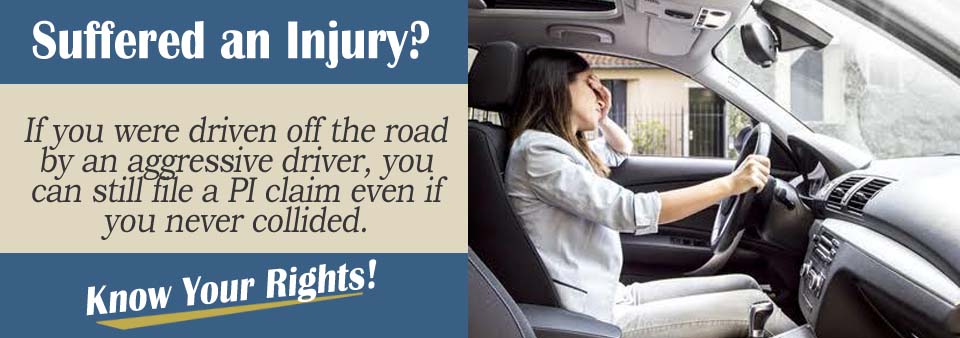Aggressive drivers are everywhere. Coming upon one on the road can be nerve-wracking if not terrifying. Many times, the actions of an aggressive driver result in an accident, even if no actual collision takes place.
You do have options in seeking claims for your injuries, however, and it is important you know what those options are.
We have asked attorney, Alaina Sullivan, about what you should do. Here is what she had to say:
What Is Aggressive Driving?
Aggressive driving amounts to intentional behavior that results in harm, usually in the form of a car accident. The accident can be intentional or not intentional depending on the behavior. The most common behaviors include speeding, tailgating, racing other cars on the roadway or erratic lane changes.
However, it can go as far as the angry driver trying to run another driver off the road and intentionally cause harm to that person. That is when things get very serious very quickly.
Aggressive Driving as a Criminal Offense
Per the AAA Foundation for Traffic Safety, 106,727 fatal crashes occur every year. Around 55 percent of these accidents occur because of aggressive driving. Aggressive driving is not only a traffic offense but also a criminal one, as well, if taken to the extreme.
Road rage is also treated as vehicular assault if the driver fears his or her life is in danger because of the actions of another behind the wheel. This is otherwise known as road rage.

What Actions Can I Take?
If you have been driven off the road, resulting in damage to your vehicle or yourself, you certainly can pursue criminal action against the driver. It is recommended you always call the police and obtain a police report with any car accident, but it is vital when it comes to a car accident caused by road rage or aggressive driving.
Give the details to the police, and they will likely as if you wish to press charges. You can say yes and pursue that avenue, but you can also take civil action as well.
Civil action will involve you proving the driver was negligent in his actions on the road. Like any personal injury case, this negligence cause of action will require you to show that the aggressive driver owed you a duty of care, that the offender breached that duty of car, that his conduct caused you harm and that there are damages resulting from his actions.
Duty of Care
Any motorist owes others on the road a duty of care to act in a manner that will not cause harm to other drivers. This duty normally requires the driver follow traffic laws and drive with caution as to others around him or her.
Proving a duty of care can be very fact specific since that duty can change depending on the circumstances. For instance, if it is snowing and the roads are slick, the need to be cautious goes up even more. Driving erratically in these types of conditions can be fatal and extremely irresponsible.
Breaching the Duty of Care
If the aggressive driver is knowingly disregarding these traffic laws and driving in a way that shows no care for the safety of others, they are clearly breaching that duty. Causing another driver to go off the road because of aggressive driving would be a given when it comes to proving breach of duty of care.
Proving Causation
The aggressive driver’s actions must have caused the harm. This cause needs to be actual, meaning you would not have been harmed but for the driver’s actions and it must be foreseeable that the way the driver was acting would cause harm to you.
If the driver was intentionally trying to push you out of your lane or trying to get in your lane leaving you no choice but to drive off the road to risk a collision, causation has been proven. Again, police reports help you out a great deal in clearly demonstrating these facts.
Proving Damages
Proving damages to your case should be relatively simple. If the driver caused you to go off the road, you likely have damages to your vehicle as well as damages to your person. Personal injuries can include current medical expenses but also future ones depending on the injury.
In addition, if the injury causes you to miss a significant period of work because of your injuries, you can go after future pain and suffering damages and lost wages.
Contact an Attorney Today
A licensed personal injury attorney will be able to evaluate your case and determine if you have a claim against the other party’s insurance company. For the best chance of receiving the compensation you need to pay for medical bills, auto body bills, and pain and suffering, you should speak with a personal injury attorney in your area today.